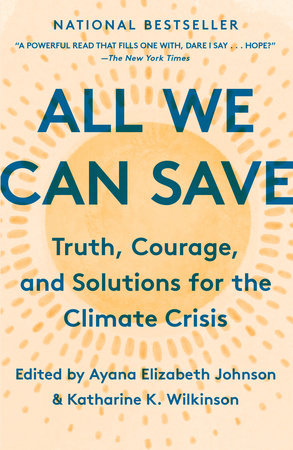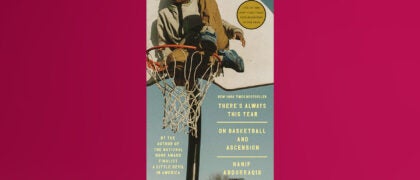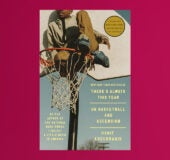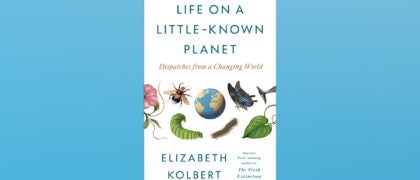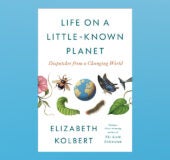Contributed by Katharine K. Wilkinson, co-editor of All We Can Save: Truth, Courage, and Solutions for the Climate Crisis
“I was shaking as I read the opening essay because I felt so empowered,” one of my students shared at the start of the fall 2020 semester. I’d spent the previous nine months co-editing the bestselling anthology All We Can Save: Truth, Courage, and Solutions for the Climate Crisis—a collection of essays, poetry, and art by women leading on climate. Pandemic disruptions had rooted me near my undergraduate alma mater, in small-town Tennessee, where I taught an undergraduate seminar course, using All We Can Save as the core text. The experience gave me a front row seat to the unique power this book brings to the classroom.
Postsecondary education is a vital training ground and intervention point for addressing the leadership crisis at the heart of the climate crisis: too many people committed to perpetuating the unjust and extractive status quo, too few using their talents and resources to shape a life-giving future. Education may be our most potent means for inviting people off the sidelines and equipping them to contribute. To use an ecological metaphor, it is soil from which climate engagement, action, and leadership grows, and we must ensure that soil is rich and nourishing.
All We Can Save contributes to the soil of climate education in critical ways. Its 41 essays focus on the climate leadership and solutions that meet the need for wholesale transformation this decade. The mosaic of voices in the anthology centers the work and wisdom of women across backgrounds, generations, fields, and lived experiences, bringing diversity and inclusion often lacking in climate discourse. All We Can Save embraces a holistic, multidisciplinary approach to our planetary crisis, to foster a fulsome, root-cause understanding of how we got into this mess and how we might get out of it. By illuminating many paths and ways to be of use in climate work, the anthology supports vocational exploration and engagement in civic life. Lastly, the integration of poetry, art, and personal reflection brings humanness and emotion to a topic historically explored with much more head than heart.
It’s been a delight to see All We Can Save picked up for use in dozens of schools, from HBCUs to state universities to Ivy Leagues, as well as in learning programs beyond the classroom. Early adopters of the anthology as a course text are using it in a wide range of subjects, including environmental studies and sciences, leadership, policy and politics, psychology, religious studies, sustainability, women’s and gender studies, and writing and communication, as well as honors and summer reading programs.
According to a recent survey of educators teaching All We Can Save, 85 percent are using it to focus on climate justice and to nurture inspiration/hope. Educators report that they value the anthology as a classroom text for five top reasons:
- It centers equity, justice, and belonging
- It welcomes fresh voices and perspectives to the climate conversation
- It extends the climate conversation beyond traditional topics/disciplines
- It brings humanness and emotionality to the topic
- It encourages engagement in creative solutions and taking action
Here are a few reflections in educators’ own words:
“[The anthology] moves beyond traditional approaches to climate education and focuses on solutions and the people who are developing and leading them. It provides new ideas and energy to students when they need it most.”
“AWCS provided a way to weave in more holistic thinking about climate solutions so students from all disciplines and a range of interests can discover their own unique agency in addressing the climate crisis.”
“The book has contributors of different ages, backgrounds, professions. What I love about that is that students can start to see how sustainability has a place in every field and profession; how there is a place for everyone in tackling the climate crisis.”
In an effort to embed climate truth, courage, and just solutions in education and to make it exceedingly easy to use the anthology within classrooms and beyond, open-source teaching and learning resources are available at allwecansave.earth, including:
- Reading circle guides: All We Can Save Circles (our deep “book club” model) provide discussion guides for each section of the anthology. The full 10-session experience works well for the classroom, facilitated by an educator or by students themselves. You can also draw selectively on the “generous questions,” journal prompts, and supplementary read-watch-listen materials. The website also includes tips on using Circles in the classroom.
- Question bank: With the classroom in mind, our living question bank includes additional discussion questions, writing prompts, and assignment ideas tailored to specific sections, essays, and poems in the anthology. We’ll be continuously adding to this resource in the coming months.
- Supporting action: In the materials for All We Can Save Circles session 10, you’ll find “what next?” guidance for readers to continue engaging and acting. Stay tuned for additional curricular resources focused on moving to action.
- Facilitation guidelines: Also in the All We Can Save Circles materials, there are tips and guidelines for facilitation, to support you in fostering inclusive, open dialogue among students.
For the concluding assignment of my fall 2020 seminar course, students were tasked with conveying their unique perspective on “the call of climate” in a TED-style talk. As I watched their videos on a gray December day, I was struck by the intimacy students had formed with the topic, which many had seemed distanced from and even daunted by on day one. Though single orators on this occasion, they were in conversation with diverse themes from All We Can Save—grappling, storytelling, critiquing, envisioning, committing. The anthology had offered them far more than a collection of writings. It had issued an invitation to be part of saving all that we can, and they were claiming their place in that mighty, growing “we.”
Further Resources Available at www.allwecansave.earth/for-educators:
-
Assignments to use your voice: These assignments explore a core theme from All We Can Save: using your voice. They’re designed to build students’ skills in climate communication, specifically op-eds and TED-style talks.
- Assignments to spark action: These assignments build on another core theme from All We Can Save: taking climate action. They’re designed to help students translate what they’re learning into accessible, meaningful action in widening circles of influence.
- Essay summaries: To navigate the content of All We Can Save with ease, these summaries offer a high-level overview of each essay, as well as brief author bios, key terms introduced, and additional leaders highlighted in the piece.
- TED Talks to pair with All We Can Save: We’ve also curated a list of relevant TED talks that pair well with each section of All We Can Save (some featuring contributors to the anthology).


